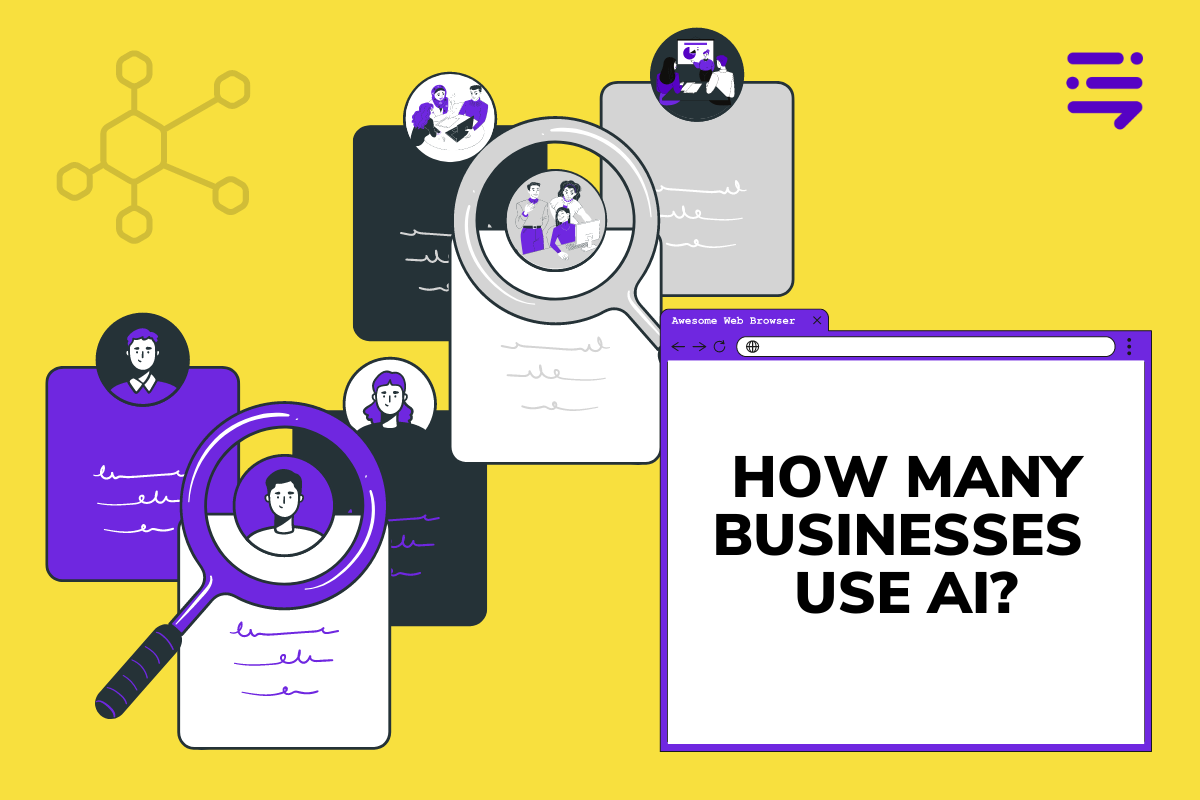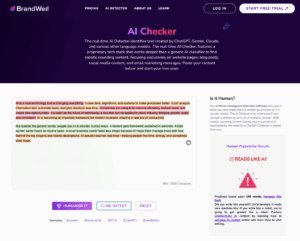How many businesses use AI?
Artificial intelligence, which was once considered a novelty for tech giants, is now mainstream technology.
Since OpenAI introduced ChatGPT free of charge back in November 2022, AI has swept through various sectors — changing the way businesses operate.
Let’s explore how many businesses use AI to boost productivity, save resources, and gain a competitive edge.
Table of Contents:
- Top AI for Business Statistics
- How Many Businesses Use AI?
- How Big Is the AI Market?
- What Company Is Leading the AI Race?
- What Are the Major Factors Driving Companies to Adopt AI?
- Who Are the Top AI Users in a Business or Organization?
- How Are Companies Using AI, or What Are They Considering Using AI For?
- How Are Companies Using or Considering Using Natural Language Processing (NLP) Solutions?
- How Are Businesses Using AI to Improve Customer and Employee Care?
- What Barriers Do Companies Face When Adopting AI?
- What Industries Will Not Be Affected by AI?
- The Impact of AI on Business
- The Challenges of AI in Business
- Conclusion
Top AI for Business Statistics
- The global AI market is expected to reach $1.87 trillion by 2032.
- 97% of business owners believe ChatGPT will help their company.
- 95% of customer interactions will be powered by AI by 2025.
- 91% of top businesses have an ongoing investment in AI.
- 90% believe that ChatGPT will positively impact their businesses within the next 12 months.
- 92% of businesses have seen measurable results from AI.
- 75% of executives fear they’ll go out of business in the next five years if they don’t implement AI.
- 73% of businesses use or plan to use chatbots to communicate with customers.
- 73% of Australian brands believe AI is a driving force behind business success. 64% believe AI will improve customer relationships.
- 58% of companies in China are already deploying AI — the highest adoption rate in the world.
- AI could displace 400 million to 800 million individuals by 2030.
- By 2025, 97 million new roles may emerge in the new division of labor between humans, machines, and algorithms.
Sources: Forbes, Precedence Research, NewVantage Partners, World Economic Forum, Servion Global Solutions, IBM, McKinsey, Fortune, Deloitte
How Many Businesses Use AI?
How many businesses use AI? Multiple studies and surveys show that over 80% of businesses have already adopted artificial intelligence technology in their operations to some degree.
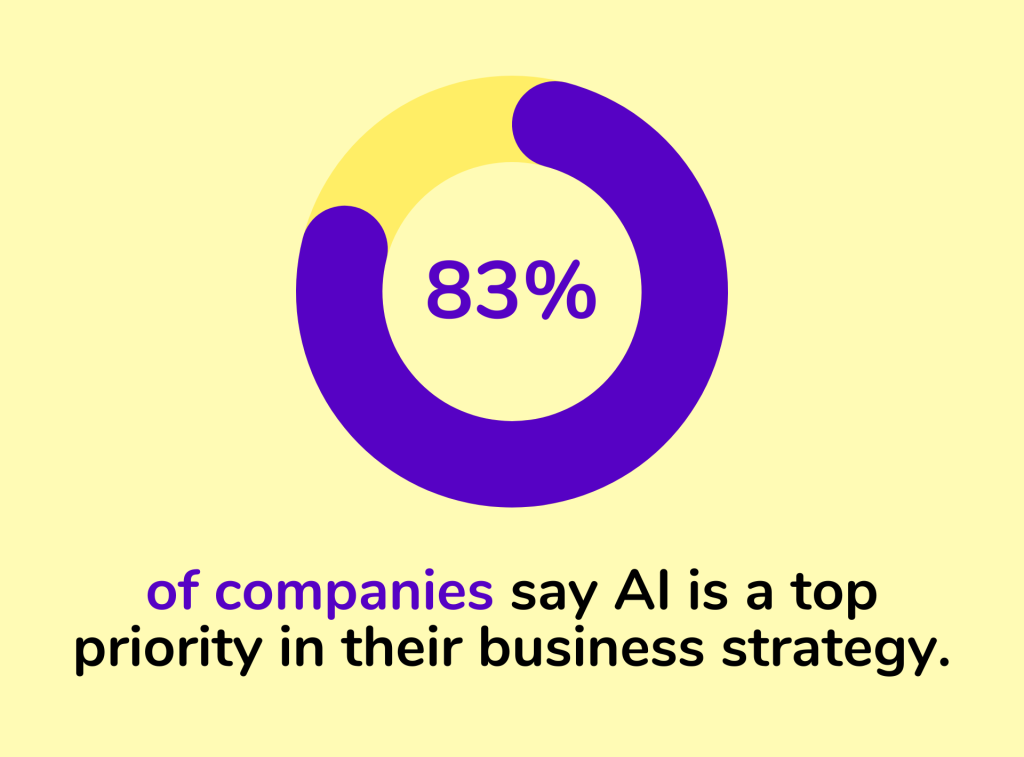
To start, many businesses are adopting AI in their business and marketing strategies.
- 83% of companies say AI is a top priority in their business strategy.
- By 2025, 80% of companies will adopt intelligent automation — a combination of artificial intelligence and automation.
- 80% of retail executives will adopt AI within the next three years.
- In the UK, 68% of large companies use at least one AI technology compared to just 34% of medium-sized companies and 15% of small businesses.
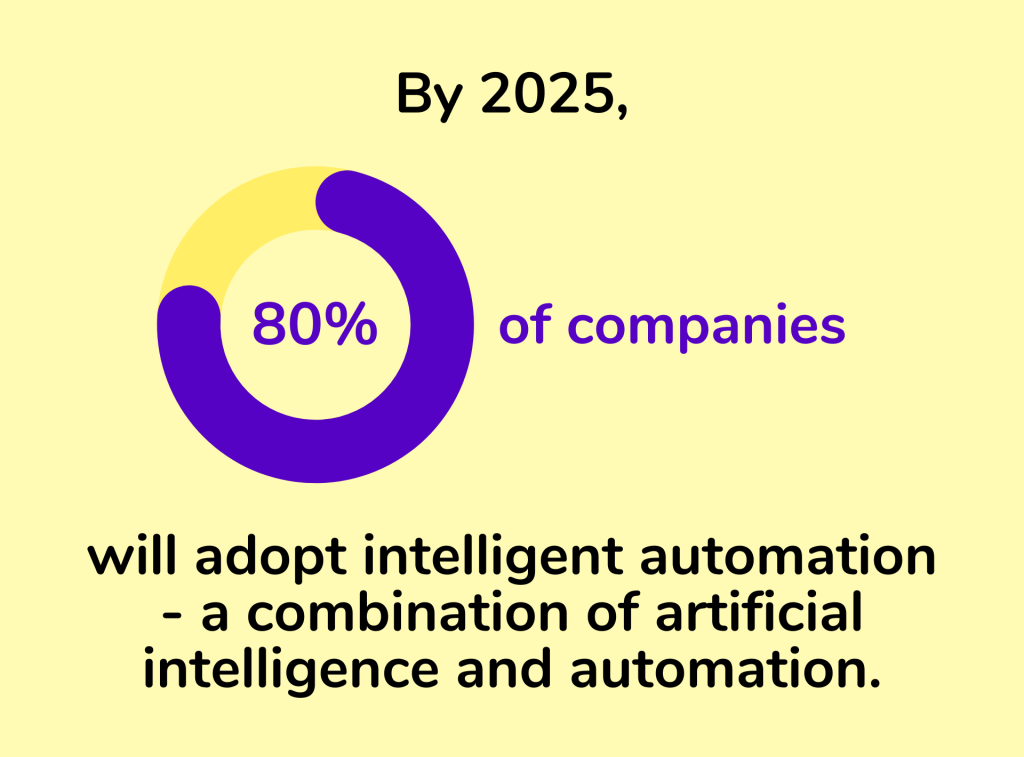
How are these businesses using AI? What tasks are they automating, and for what processes are they augmenting human labor and brainpower with artificial intelligence?
- 61% of companies use AI to optimize emails.
- 56% of businesses use AI for customer service.
- 55% of companies rely on AI for product recommendations and other personalized services.
- 53% of businesses apply AI to improve production processes.
- 52% of telecom companies deploy chatbots.
- 51% of companies use AI for cybersecurity and fraud management.
- 48% of businesses use machine learning (ML), data analysis, and AI tools to maintain the accuracy of their data.
- 46% of businesses use AI for internal communications such as plans, presentations, and reports.
- 46% of companies manage customer relationships with AI.
- 46% of companies leverage AI for personalized advertising while 42% use it to write long-form content.
- 47% of businesses use AI as digital personal assistants.
- 40% of companies use AI to manage inventory.
- 40% of companies use AI for data aggregation.
- 38% of businesses minimize safety risks with AI.
- 38% percent of healthcare providers rely on computer-assisted diagnostics.
- 31% of businesses employ AI for writing code and 29% for writing website copy.
- 30% of businesses use AI for accounting.
- 30% of companies use AI in supply chain operations.
- 26% of businesses source and recruit talent with AI.
- 25% of companies are adopting AI to address labor or skills shortages.
- 24% of companies use AI for audience segmentation.
Sources: Forbes Advisor Survey, Forbes, Analytics Insight, Gartner, O’Reilly, IBM, Juniper Research, Gov.UK
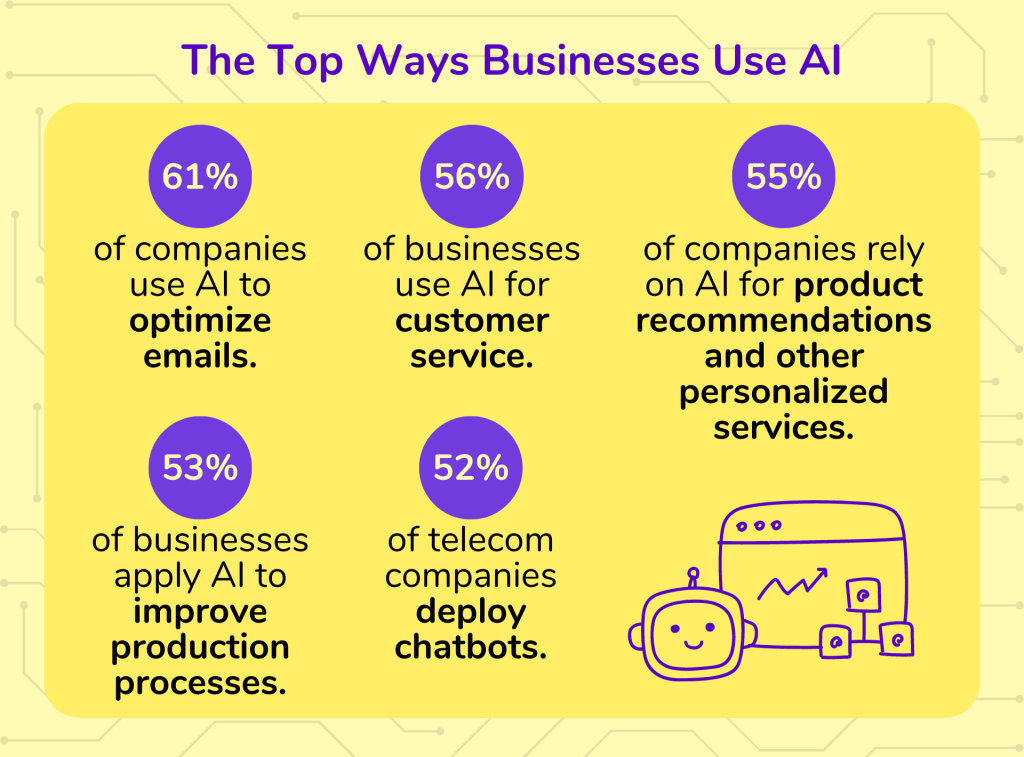
How Big Is the AI Market?
The global AI market is currently worth $136.6 billion and is predicted to grow by 38% every year in the next decade.
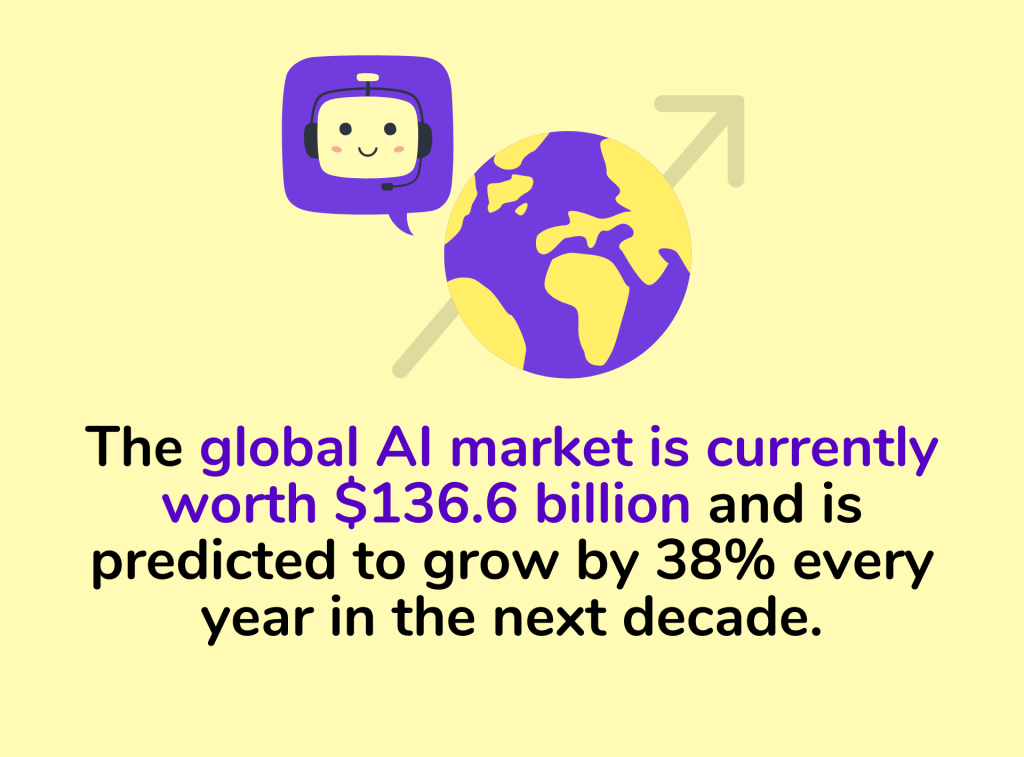
The AI market is expected to grow by 38% in 2023, 33% in 2024, and 26% in 2025.
Tech giants are investing billions of dollars in the research and development of AI, driving the adoption of advanced technologies in aerospace, manufacturing, finance, automotive, healthcare, retail, and security.
AI technology could generate $15.7 trillion in revenue by 2030, boosting the GDP of China by 26% and North America by 14.5% — accounting for almost 70% of the global economic impact.
Sources: GrandViewResearch, PwC, Tractica
What Company Is Leading the AI Race?
Companies with access to large repositories of data are leading the AI race. Among the key players are:
- Apple
- Amazon
- Microsoft
- IBM
- OpenAI
- Intel
- Nvidia
- Baidu
- Alibaba
- Tencent
Source: GlobalData
Key Consumer AI Companies Statistics
- 51% of the Consumer AI companies are bootstrapped
- 41% of the AI companies are not based in the U.S.
- Out of the 100 Gen AI companies, 9 were either founded or co-founded by women
- Popular AI categories are Image Utility, Chatbots, Art Generation, Voice Generation, and Video Utility
- 7% of AI websites have content that’s not safe for work (NSFW)
- 22 companies have brown founders and co-founders, with a significant number of Indian origin and only AskYourPDF has a Black co-founder
- 9 applications have already been acquired
- AI websites pull in a median traffic of 4.97 million visits monthly, with an average of 29.02 million
- The average funding secured by these companies is $396.01, with a median funding of a staggering $20.05 million
- The majority of these companies were established in 2023, with 2021 as the median launch year and 2020 as the average
51% of Consumer AI Applications Are Bootstrapped

In our study of 100 consumer AI applications, more than half (51%) are completely bootstrapped, while 49% have received external funding.
Notably, 9 companies have secured over $100 million in funding, and 3 have crossed the remarkable $1 billion milestone.
OpenAI stands out with an incredible $57.9 billion in total funding, with support from Microsoft as a major investor.
| Description | Number of Companies | Company Names |
|---|---|---|
| Companies with over $1 billion in funding | 3 | ChatGPT, Claude AI, Pi Ai |
| Companies with over $100 million in funding | 9 | ChatGPT, DeepL Translator, Character AI, Poe, Claude AI, Jasper AI, Runway AI, Stable Diffusion – Clip Drop, Synthesia |
| Highest Funded Company | 1 | ChatGPT (OpenAI) – $11.3 billion with support from Microsoft |
41% of the Top 100 Consumer AI Companies Are Not From the U.S.

Out of all these Gen AI applications, 41% are not based in the United States, including significant contributors like the United Kingdom, Germany, India, and Australia. This highlights how Gen AI’s influence is expanding worldwide.
| Sl. No | Countries | Gen AI Applications |
|---|---|---|
| 1 | India | 3 |
| 2 | Australia | 3 |
| 3 | Germany | 4 |
| 4 | United Kingdom | 5 |
| 5 | Other Countries | 26 |
9 of the Top 100 Gen AI Applications Have Been Acquired
| Applications | Acquired By |
|---|---|
| Kaleido AI | Canva |
| QuillBot | Course Hero |
| Nuance | Microsoft |
| OctoAI and Brev.dev | NVIDIA |
| Clip Drop | Stability AI |
| Rytr and Frase | Copysmith |
| Leonardo.AI | Canva |
| Bluewillow AI | Limewire |
| Neeva | Snowflake |
Several companies are actively acquiring leading Consumer AI products, highlighting the sector’s growth potential.
Meanwhile, prominent names like Microsoft also see value in this domain.
9% of The Companies Have Women Founders/Co-Founders

Out of the 100 Gen AI products, 9 were either founded or co-founded by women, emphasizing female leadership in tech.
Notable GenAI web products such as Claude AI by Anthropic, Murf AI, and Let’s Enhance.io are entirely founded and led by women entrepreneurs.
Popular Consumer Gen AI Categories

Among the top Gen AI categories, image utility leads with 14 companies, followed by Chatbots with 13.
Art generation, especially text-to-image generation, is rapidly gaining traction with 9 companies.
Voice generation and video utility follow, with 8 and 5 companies respectively.
| Gen AI Categories | Number of Companies |
|---|---|
| Image Utility | 14 |
| Chatbots | 13 |
| Art Generation (Text-to-Image) | 9 |
| Voice Generation | 8 |
| Video Utility | 5 |
7% of Gen AI Products Are Flagged for NSFW Content
7% of the Gen AI products on our list are flagged for NSFW content.
Janitor AI, Chub AI, and Crushon AI are NSFW chatbots.
SoulGen, Openart AI, and Unstable Diffusion are tools for NSFW image generation, while PromotHero is an NSFW AI search engine prompt.
22 Generative AI Companies Have Brown Founders

21 company founders are brown, and the majority of them are of Indian origin. It’s a way of acknowledging and celebrating the diversity of founders in Generative AI.
Gen AI Websites Pull In a Median Traffic of 4.97 Million Visits Monthly, With an Average of 29.02 Million

| Sl. No | Company Name | Monthly Visits |
|---|---|---|
| 1 | ChatGPT | 1.509B |
| 2 | DeepL Translator | 244.4M |
| 3 | Character AI | 198.2M |
Most websites get around 4.97 million visitors each month. However, some are super popular.
Websites like ChatGPT, DeepL Translator, and Character AI have way more visitors, which pushes the average up to 29.02 million. These sites are clear favorites among users.
The Average Funding Secured By These Companies is $396.01 Million, With a Median Funding of $20.05 Million

| Product / Company Name | Total Funding Amount |
|---|---|
| ChatGPT (OpenAI) | $11.3B |
| Claude AI (Anthropic) | $2.8B |
| Pi AI (Inflection AI) | $1.5B |
ChatGPT, Claude AI, and Pi AI are the companies that have raised more than $1 billion in total funding.
ChatGPT got the most with $11.3 billion.
Top 10 Consumer Gen AI Products By Monthly Visits

| Product / Company Name | Monthly Visits |
|---|---|
| ChatGPT | 1.509B |
| DeepL Translator | 244.4M |
| Character AI | 198.2M |
| Bard | 171M |
| Poe | 72.19M |
| removebg – Kaleido AI | 59.02M |
| QuillBot | 53.39M |
| LINER AI | 51.01M |
| CIVIT AI | 29.15M |
| Midjourney | 25.44M |
ChatGPT stands out as the leader in monthly visits for August, pulling in a massive 1.509 billion visits. The other GenAI applications, like DeepL Translator and Character AI, also had impressive numbers, but they were in the millions.
Here’s the full breakdown of our study on each Gen AI application and its corresponding data.
What Are the Major Factors Driving Companies to Adopt AI?
Along with how many businesses use AI, another question we need to ask is why those companies are turning to artificial intelligence. As it turns out, many of them are feeling pressure from both external and internal sources.
Here are the biggest reasons companies are moving to adopt AI:
- 43% – The accessibility of AI advancements
- 42% – Need to reduce cost and automate key processes
- 37% – Increase the amount of AI integration into off-the-shelf business applications
- 31% – Competitive pressure
- 31% – Demand due to the COVID-19 pandemic
- 25% – Pressure from customers
- 23% – Directive from company leadership
- 22% – Company culture
- 22% – Labor or skills shortage
- 20% – Environmental pressure
Source: IBM
Who Are the Top AI Users in a Business or Organization?
Who uses AI the most in a business or organization? Overwhelmingly, that’s IT professionals, followed closely by data engineers, developers/data scientists, and security professionals.
- 54%- IT professionals
- 35% – Data engineers
- 29% – Developers and data scientists
- 26% – Security professionals
- 25% – Customer service professionals
- 23% – Marketing professionals
- 21% – Product managers
- 21% – Sales professionals
- 21% – HR professionals
- 21% – Finance professionals
Source: IBM
How Are Companies Using AI, or What Are They Considering Using AI For?
Overwhelmingly, most businesses are using AI for automation.
- 37% – Automating IT operations
- 32% – Automating IT or software asset management
- 29% – Activity monitoring
- 28% – Automating customer care experiences
- 27% – Automating business workflows
- 26% – Real-time inventory management
- 25% – 5G services
- 24% – Supply chain efficiency and resiliency
- 21% – Digital workers
- 19% – Networking or network slicing
- 18% – Environmental and sustainability performance
- 18% – Smart meters monitoring and control
- 18% – Asset utilization
- 17% – Transportation optimization
- 15% – ESG reporting
- 15% – Physical structure monitoring
- 14% – Wearables for training and site maintenance
- 13% – AI governance
- 13% – Sensor-based manufacturing
- 11% – Autonomous vehicles and drones
- 10% – Weather and climate risks
Source: IBM
How Are Companies Using or Considering Using Natural Language Processing (NLP) Solutions?
- 38% – Customer care
- 36% – Security
- 32% – Business development
- 30% – Sales
- 29% – Marketing
- 28% – Human resources or employee services
- 26% – Finance
- 25% – Supply chain or procurement
- 23% – Market research
- 20% – Corporate governance or ESG
- 18% – Legal or compliance
Source: IBM
How Are Businesses Using AI to Improve Customer and Employee Care?
Businesses aren’t just using AI to streamline processes and cut costs. They’re also using artificial intelligence to improve how they provide services and support to their customers.
- 36% – Improve customer service agent productivity
- 35% – Create more personalized experiences
- 34% – Streamline how customers and employees find information
- 31% – Survey or feedback analysis
- 28% – Decrease call wait times
- 26% – More targeted or personalized advertising
- 25% – Email or text classification
- 25% – Identify new revenue streams or cross-sell or upsell opportunities
- 24% – Manage increasing call center volume
- 16% – Sentiment analysis
Source: IBM
What Barriers Do Companies Face When Adopting AI?
What are the main roadblocks businesses face for AI adoption? Ultimately, the biggest one is a lack of skills and training.
- 63% – Lack of skills and training to develop and manage AI.
- 60% – AI tools that don’t work across all data environments.
- 59% – Lack of an AI strategy.
- 57% – AI outcomes that are not explainable.
- 57% – Lack of company guidelines for developing trustworthy, ethical AI.
- 57% – AI vendors who don’t include explainability features.
- 56% – Lack of regulatory guidance from governments or industry.
- 56% – Building models on data that has inherent social or economic bias.
Source: IBM
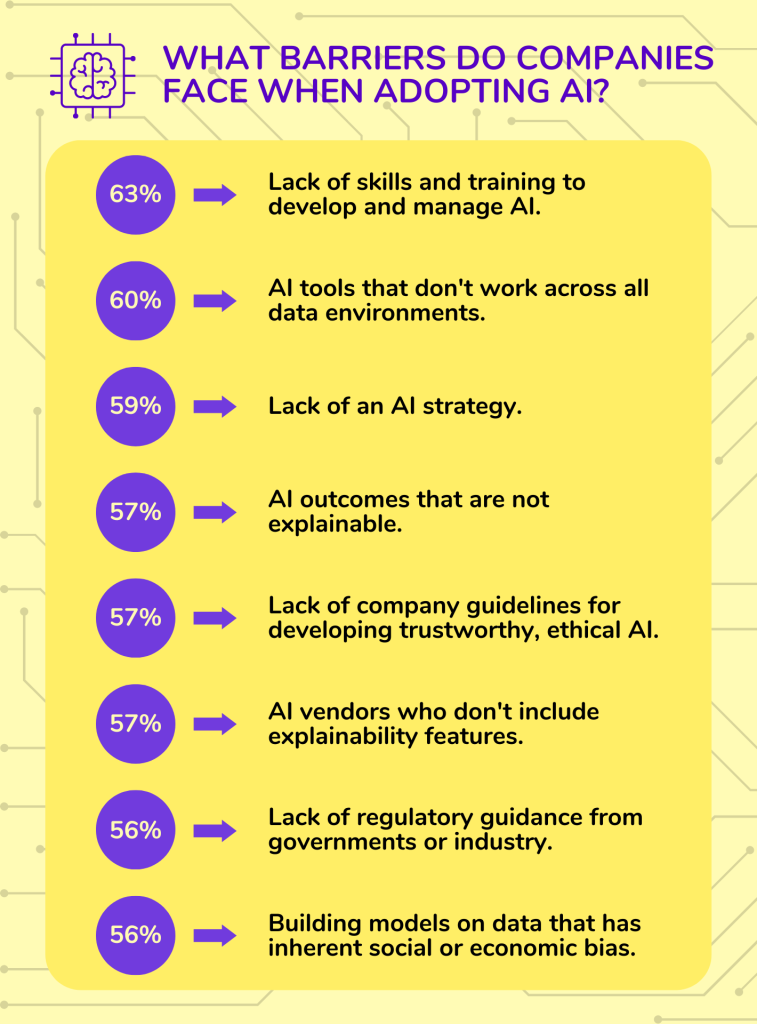
What Industries Will Not Be Affected by AI?
Jobs with repetitive tasks are the most susceptible to an AI takeover.
In contrast, those that are unpredictable and involve non-routine functions are the safest. These include:
- Creative work that requires building something new or thinking outside the box.
- Human-centered work that requires a deep understanding of clients.
- Skilled trade that requires physical dexterity, mobility, and flexibility.
Here are some of the top fields that offer job stability in the world of AI:
- Nursing
- Physical therapy
- Agriculture
- Education
- Human resources management
- Psychology
- Social work
- Personal care
- Software engineering
- Law
- Sports
- Architecture
- Equipment installation and repair
- Bus and truck maintenance
- Cleaning
- Construction and extraction
- Food and beverage preparation
- Heavy machine operation
- Farming, fishing, and forestry
- Arts and entertainment
- Community service
- Sales
Sources: Forbes, University of Southern California, University of Pennsylvania, Goldman Sachs
The Impact of AI on Business
Most business owners believe employing artificial intelligence can be beneficial to their company.
- 81% of employees say AI helps improve their overall performance at work.
- 68% of employees want their employers to implement more AI to help them work better and faster.
- 64% of companies believe AI will improve customer relationships and increase productivity.
- 60% of business owners expect AI to drive sales growth.
- 59% of companies believe AI will help them save costs.
- 54% of firms using AI are already enjoying cost savings and efficiencies.
- 53% of business owners expect AI to decrease response times.
- 51% of employees believe AI in the workplace helps them achieve better work-life balance.
- 48% of companies think AI will help reduce errors.
- 44% of business owners perceive AI as an asset for improving decision-making.
- 42% of companies believe AI can help streamline job processes.
What about the impact of AI on performance? As it turns out, AI is great for productivity, which can lead to increased performance and revenue:
- AI has the potential to boost employee productivity by about 40% by 2035.
- Manufacturers that implement AI are performing 12% better than competitors that continue to stick to manual methods.
- Brands that have adopted AI reported an 85% increase in sales revenue during the turbulent post-COVID economy.
Industries That Will Grow with AI
AI could bring $3.78 trillion in additional gross value to the manufacturing sector by 2035. What are some other industries that stand to gain big from AI?
- Wholesale and Retail: $2.23 trillion
- Professional Services: $1.85 trillion
- Financial Services: $1.15 trillion
- Information and Communication: $951 billion
- Public Services: $939 billion
- Transportation and Storage: $744 billion
- Construction: $520 billion
- Food and Accommodation Services: $489 billion
- Healthcare: $461 billion
- Utilities: $304 billion
- Social Services: $216 billion
- Agriculture, Forestry, and Fishing: $215 billion
- Education: $109 billion
- Arts, Entertainment, and Recreation: $87 billion
Industries at Risk for AI Job Automation
AI could impact 30% of existing UK jobs by 2030. Let’s break down the industry sectors that are at high risk of job automation:
- Water, sewage, and waste management: 62.6%
- Transportation and storage: 56.4%
- Manufacturing: 46.4%
- Wholesale and retail trade: 44%
- Administrative and support services: 37.4%
- Financial and insurance: 32.2%
- Public administration and defense: 32.1%
- Electricity and gas supply: 31.8%
- Real estate: 28.2%
- Information and communication: 27.3%
- Professional, scientific, and technical: 25.6%
- Food and accommodation services: 25.5%
- Construction: 23.7%
- Mining and quarrying: 23.1%
- Arts and entertainment: 22.3%
- Agriculture, forestry, and fishing: 18.7%
- Human health and social work: 17%
- Education: 8.5%
- Domestic personnel and self-subsistence: 8.1%
Job Replacement
According to a Forrester report, robots will replace 7% of jobs in the US by 2025.
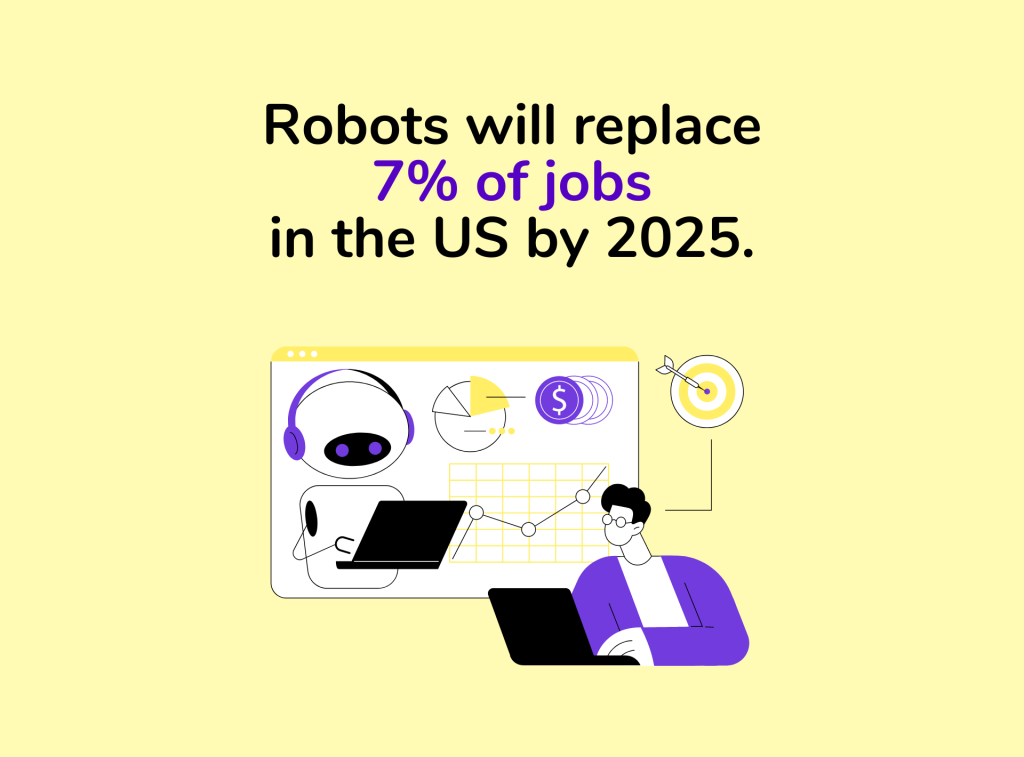
- While 6% of jobs will be replaced, 9% will be created (equivalent to 8.9 million new jobs).
- The most disruption will occur in office and administrative support.
- New professions will include data scientists, robot monitoring experts, automation specialists, and content curators.
- 93% of automation technologists feel unprepared to tackle the challenges of working with smart machines.
Sources: Forbes, SnapLogic, IBM, PwC, Accenture, Microsoft, PwC, Forrester, Think With Google
The Challenges of AI in Business
While many potential benefits exist for implementing AI in business, executive leaders also share some concerns.
- 76% of CEOs worry about the lack of transparency and potential for bias in adopting AI.
- 67% of executive leaders are concerned with the potential of AI to disrupt society.
- 43% of business owners expressed concern about becoming too reliant on AI.
- 35% are anxious about the skills needed to use AI efficiently.
- 33% worry that AI implementation could lead to human job loss.
- 31% have expressed concern over data security and privacy issues in the age of AI.
- 30% are concerned about AI generating misinformation.
- 24% worry that AI might affect their brand visibility with 65% of consumers preferring to use ChatGPT instead of search engines.
- 24% worry that AI may negatively impact customer relationships.
How Many Businesses Use AI? The Number is Exploding
Ultimately, the question “How many businesses use AI?” will become moot, as total adoption is rapidly becoming a reality.
These numbers show that the future of business is AI. Artificial intelligence is already changing the way businesses operate and its impact is only going to be more profound and far-reaching.
AI has the potential to revolutionize various aspects of business operations, from enhancing productivity and efficiency to driving innovation and customer experiences.
The biggest takeaway? Companies that embrace AI technologies stand to gain a competitive edge while those that fail to adapt may struggle to keep up.
Are you ready to adapt? Start with your content marketing — and BrandWell: an AI tool specifically built for growing your brand.

